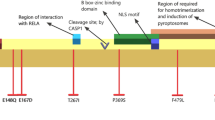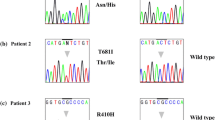Abstract
Familial Mediterranean fever (FMF) has traditionally been considered as a monogenic autosomal recessive disorder caused by mutations in the MEFV gene with highest incidence among Mediterranean populations. In a considerable number of patients with typical FMF, only one MEFV mutation was identified and the possibility that more than one autoinflammatory gene may be responsible for their disease was investigated. In the present study, an extensive search for possible mutations in three hereditary recurrent fever (HRF) genes was performed in 128 MEFV heterozygous Greek–Cypriots clinically diagnosed based on their phenotype with FMF-like disease from a previous study. Sequence analysis was performed for MVK, TNFRSF1A and NLRP3 genes which is also known to cause HRFs. In total, three patients were identified with heterozygous mutations and a second mutation in an autoinflammatory gene. Two patients carried a MEFV mutation and a NLRP3 mutation, and an additional third carried a MEFV mutation and a TNFRSF1A mutation. Patient 1 carried MEFV p.[Val726Ala] (NM_000243.2:c.2177T >C) and NLRP3 p.[Val198Met] (NM_001243133.1:c.592G >A) variants and patient 2 carried MEFV p.[Glu148Gln] (NM_000243.2:c.442G >C) variant which is of uncertain significance and NLRP3 p.[Arg176Trp] (NM_001243133.1:c.526C >T). Lastly, patient 3 was identified to carry MEFV p.[Met694Val] (NM_000243.2:c.2080A >G) and TNFRSF1A p.[Arg121Gln] (NM_001065.3:c.362G >A) variants. The results from this study indicate that screening of genes known to cause HRFs in patients already identified with a single MEFV mutation, can reveal quite rare but potentially causative mutational combinations at different loci. Such interaction provide further evidence for possible locus–locus interactions and phenotypes resulting from digenic inheritance.

Similar content being viewed by others
References
Abdwani R., Abdalla E., Al Abrawi S. and Al-Thihli K. 2015 TNFRSF1A gene causing tumor necrosis factor receptor-associated periodic syndrome in 2 siblings displaying variable disease severity and discordant heterozygosity for an MEFV E148Q variant. J. Rheumatol. 42, 1534–1535.
Aganna E., Martinon F., Hawkins P. N., Ross J. B., Swan D. C., Booth D. R. et al. 2002 Association of mutations in the NALP3/CIAS1/PYPAF1 gene with a broad phenotype including recurrent fever, cold sensitivity, sensorineural deafness, and AA amyloidosis. Arthritis. Rheum. 46, 2445–2452.
Aldea A., Campistol J. M., Arostegui J. I., Rius J., Maso M., Vives J. et al. 2004 A severe autosomal-dominant periodic inflammatory disorder with renal AA amyloidosis and colchicine resistance associated to the MEFV H478Y variant in a Spanish kindred: an unusual familial Mediterranean fever phenotype or another MEFV-associated periodic inflammatory disorder? Am. J. Med. Genet. A 124A, 67–73.
Bader-Meunier B., Florkin B., Sibilia J., Acquaviva C., Hachulla E., Grateau G. et al. 2011 Mevalonate kinase deficiency: a survey of 50 patients. Pediatrics 128, e152–e159.
Ben-Chetrit E., Lerer I., Malamud E., Domingo C. and Abeliovich D. 2000 The E148Q mutation in the MEFV gene: is it a disease-causing mutation or a sequence variant? Hum. Mutat. 15, 385–386.
Booth D. R., Gillmore J. D., Lachmann H. J., Booth S. E., Bybee A., Soyturk M. et al. 2000 The genetic basis of autosomal dominant familial mediterranean fever. QJM 93, 217–221.
Booty M. G., Chae J. J., Masters S. L., Remmers E. F., Barham B., Le J. M. et al. 2009 Familial mediterranean fever with a single MEFV mutation: where is the second hit Arthritis Rheum. 60, 1851–1861.
Caglar M. K., Altugan F. S., Ozyurt H. and Atasoy H. I. 2008 Screening of family members of children with familial mediterranean fever: true-autosomal and pseudo-autosomal inheritance. Acta Reumatol. Port. 33, 415–420.
De Pieri C., Vuch J., De Martino E., Bianco A. M., Ronfani L., Athanasakis E. et al. 2015 Genetic profiling of autoinflammatory disorders in patients with periodic fever: a prospective study. Pediatr. Rheumatol. Online J. 13, 11.
Federici S., Caorsi R. and Gattorno M. 2012 The autoinflammatory diseases. Swiss Med. Wkly. 142, w13602.
Federici S., Sormani M. P., Ozen S., Lachmann H. J., Amaryan G., Woo P. et al. 2015 Evidence-based provisional clinical classification criteria for autoinflammatory periodic fevers. Ann. Rheum. Dis. 74, 799–805.
Hoffman H. M., Mueller J. L., Broide D. H., Wanderer A. A. and Kolodner R. D. 2001 Mutation of a new gene encoding a putative pyrin-like protein causes familial cold autoinflammatory syndrome and Muckle-Wells syndrome. Nat. Genet. 29, 301–305.
Horneff G. 2015 Autoinflammatory syndromes in childhood. Z. Rheumatol. 74, 511–524.
Hull K. M., Drewe E., Aksentijevich I., Singh H. K., Wong K., McDermott E. M. et al. 2002 The TNF receptor-associated periodic syndrome (TRAPS): emerging concepts of an autoinflammatory disorder. Medicine (Baltimore) 81, 349–368.
Jeru I., Hentgen V., Cochet E., Duquesnoy P., Le Borgne G., Grimprel E. et al. 2013 The risk of familial mediterranean fever in MEFV heterozygotes: a statistical approach. PLoS One 8, e68431.
Konstantopoulos K., Kanta A., Deltas C., Atamian V., Mavrogianni D., Tzioufas A. G. et al. 2003 Familial mediterranean fever associated pyrin mutations in Greece. Ann. Rheum. Dis. 62, 479–481.
Konstantopoulos K., Kanta A., Lilakos K., Papanikolaou G. and Meletis I. 2005 Familial mediterranean fever and E148Q pyrin gene mutation in Greece. Int. J. Hematol. 81, 26–28.
Kubota K., Ohnishi H., Teramoto T., Matsui E., Murase K., Kanoh H. et al. 2013 In vitro analysis of the functional effects of an NLRP3 G809S variant with the co-existence of MEFV haplotype variants in atypical autoinflammatory syndrome. J. Clin. Immunol. 33, 325–334.
La Regina M., Nucera G., Diaco M., Procopio A., Gasbarrini G., Notarnicola C. et al. 2003 Familial mediterranean fever is no longer a rare disease in Italy. Eur. J. Hum. Genet. 11, 50–56.
Lidar M. and Livneh A. 2007 Familial mediterranean fever: clinical, molecular and management advancements. Neth. J. Med. 65, 318–324.
Marek-Yagel D., Berkun Y., Padeh S., Abu A., Reznik-Wolf H., Livneh A. et al. 2009 Clinical disease among patients heterozygous for familial mediterranean fever. Arthritis Rheum. 60, 1862–1866.
Mereuta O. M., Baldovino S., Errichiello E., Binello G. B., Restagno G., Battaglia G. G. et al. 2013 Systemic AA amyloidosis as a unique manifestation of a combined mutation of TNFRSF1A and MEFV genes. Amyloid 20, 122–126.
Milhavet F., Cuisset L., Hoffman H. M., Slim R., El-Shanti H., Aksentijevich I. et al. 2008 The infevers autoinflammatory mutation online registry: update with new genes and functions. Hum. Mutat. 29, 803–808.
Moussa T., Aladbe B., Taha R. Z., Remmers E. F., El-Shanti H. and Fathalla B. M. 2015 Overlap of familial mediterranean fever and hyper-IgD syndrome in an Arabic kindred. J. Clin. Immunol. 35, 249–253.
Neocleous V., Costi C., Kyriakou C., Kyriakides T. C., Shammas C., Skordis N. et al. 2015 Familial mediterranean fever associated with MEFV mutations in a large cohort of Cypriot patients. Ann. Hum. Genet. 79, 20–27.
Pelagatti M. A., Meini A., Caorsi R., Cattalini M., Federici S., Zulian F. et al. 2011 Long-term clinical profile of children with the low-penetrance R92Q mutation of the TNFRSF1A gene. Arthritis Rheum. 63, 1141–1150.
Pras M. 1998 Familial mediterranean fever: from the clinical syndrome to the cloning of the pyrin gene. Scand. J. Rheumatol. 27, 92–97.
Richards S., Aziz N., Bale S., Bick D., Das S., Gastier-Foster J. et al. 2015 Standards and guidelines for the interpretation of sequence variants: a joint consensus recommendation of the American college of medical genetics and genomics and the association for molecular pathology. Genet. Med. 17, 405–424.
Sarrauste de Menthière C., Terrière S., Pugnère D., Ruiz M., Demaille J. and Touitou I. 2003 INFEVERS: the Registry for FMF and hereditary inflammatory disorders mutations. Nucleic Acids Res. 31, 282–285.
Schaffer A. A. 2013 Digenic inheritance in medical genetics. J. Med. Genet. 50, 641–652.
Shinar Y., Obici L., Aksentijevich I., Bennetts B., Austrup F., Ceccherini I. et al. 2012 Guidelines for the genetic diagnosis of hereditary recurrent fevers. Ann. Rheum. Dis. 71, 1599– 1605.
Solak M., Yildiz H., Koken R., Erdogan M., Eser B., Sen T. et al. 2008 Analysis of familial mediterranean fever gene mutations in 202 patients with familial mediterranean fever. Genet. Test. 12, 341–344.
Soylemezoglu O., Kandur Y., Duzova A., Ozkaya O., Kasapcopur O., Baskin E. et al. 2015 Familial mediterranean fever with a single MEFV mutation: comparison of rare and common mutations in a Turkish paediatric cohort. Clin. Exp. Rheumatol. 33, S152–S155.
Stoffels M., Szperl A., Simon A., Netea M. G., Plantinga T. S., van Deuren M. et al. 2014 MEFV mutations affecting pyrin amino acid 577 cause autosomal dominant autoinflammatory disease. Ann. Rheum. Dis. 73, 455–461.
Stoffman N., Magal N., Shohat T., Lotan R., Koman S., Oron A. et al. 2000 Higher than expected carrier rates for familial mediterranean fever in various Jewish ethnic groups. Eur. J. Hum. Genet. 8, 307–310.
Tchernitchko D. O., Gerard-Blanluet M., Legendre M., Cazeneuve C., Grateau G. and Amselem S. 2006 Intrafamilial segregation analysis of the p.E148Q MEFV allele in familial mediterranean fever. Ann. Rheum. Dis. 65, 1154–1157.
Timerman D. and Frank N. Y. 2013 Novel double heterozygous mutations in MEFV and NLRP3 genes in a patient with familial mediterranean fever. J. Clin. Rheumatol. 19, 452–453.
Tomiyama N., Higashiuesato Y., Oda T., Baba E., Harada M., Azuma M. et al. 2008 MEFV mutation analysis of familial mediterranean fever in Japan. Clin. Exp. Rheumatol. 26, 13–17.
Touitou I. 2013 Inheritance of autoinflammatory diseases: shifting paradigms and nomenclature. J. Med. Genet. 50, 349–359.
Touitou I., Lesage S., McDermott M., Cuisset L., Hoffman H., Dode C. et al. 2004 Infevers: an evolving mutation database for auto-inflammatory syndromes. Hum. Mutat. 24, 194–198.
Touitou I., Perez C., Dumont B., Federici L. and Jorgensen C. 2006 Refractory auto-inflammatory syndrome associated with digenic transmission of low-penetrance tumour necrosis factor receptor-associated periodic syndrome and cryopyrin-associated periodic syndrome mutations. Ann. Rheum. Dis. 65, 1530–1531.
Vuch J., Marcuzzi A., Bianco A. M., Tommasini A., Zanin V. and Crovella S. 2013 Evolutionary hypothesis of the mevalonate kinase deficiency. Med. Hypotheses 80, 67–69.
Acknowledgement
This work was supported by the A. G. Leventis Foundation.
Author information
Authors and Affiliations
Corresponding author
Additional information
Corresponding editor: Subramaniam Ganesh
[Neocleous V., Byrou S., Toumba M., Costi C., Shammas C., Kyriakou C., Christophidou-Anastasiadou V., Tanteles G. A., Hadjipanayis A. and Phylactou L. A. 2016 Evidence of digenic inheritance in autoinflammation-associated genes. J. Genet. 95, xx–xx]
Rights and permissions
About this article
Cite this article
NEOCLEOUS, V., BYROU, S., TOUMBA, M. et al. Evidence of digenic inheritance in autoinflammation-associated genes. J Genet 95, 761–766 (2016). https://doi.org/10.1007/s12041-016-0691-5
Received:
Revised:
Accepted:
Published:
Issue Date:
DOI: https://doi.org/10.1007/s12041-016-0691-5




